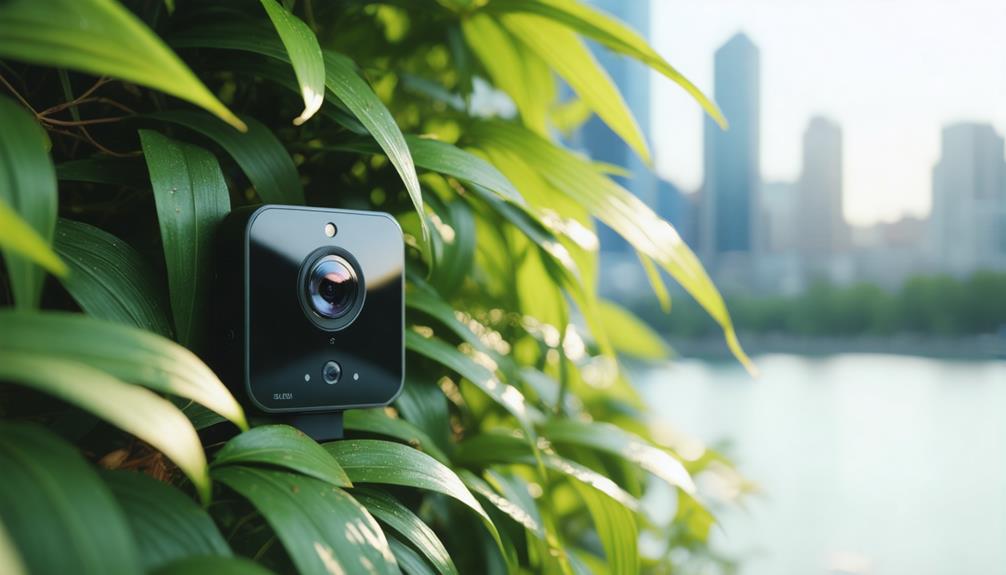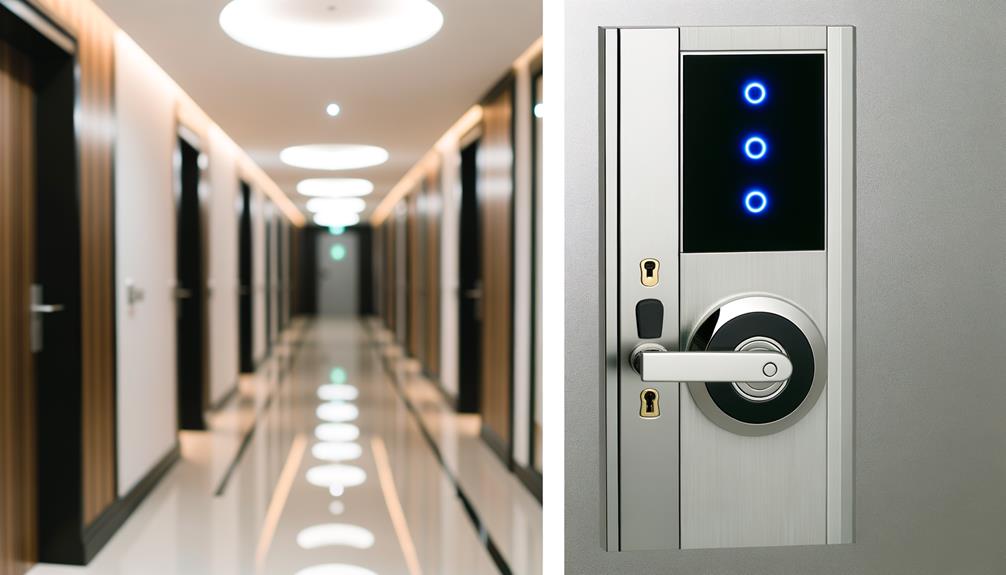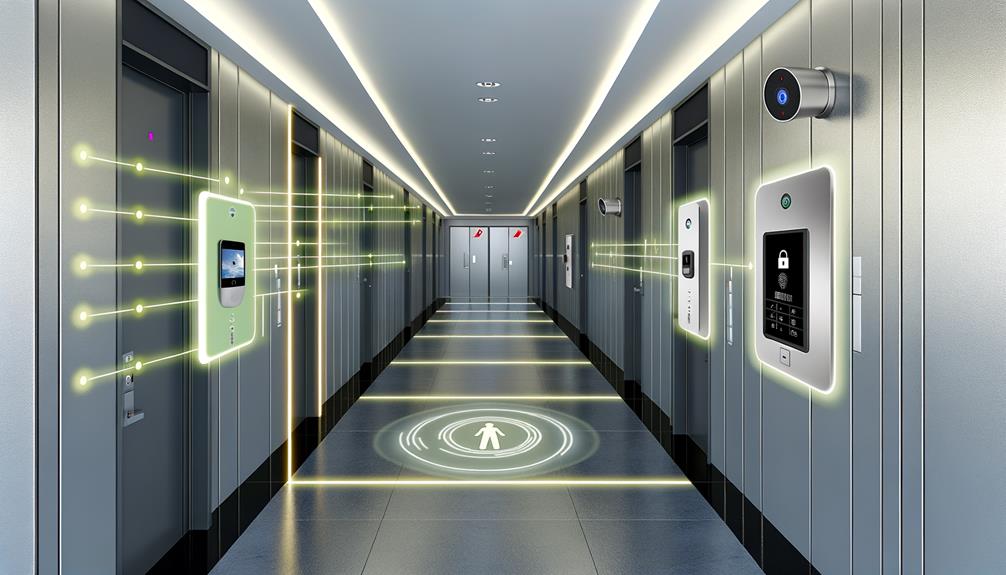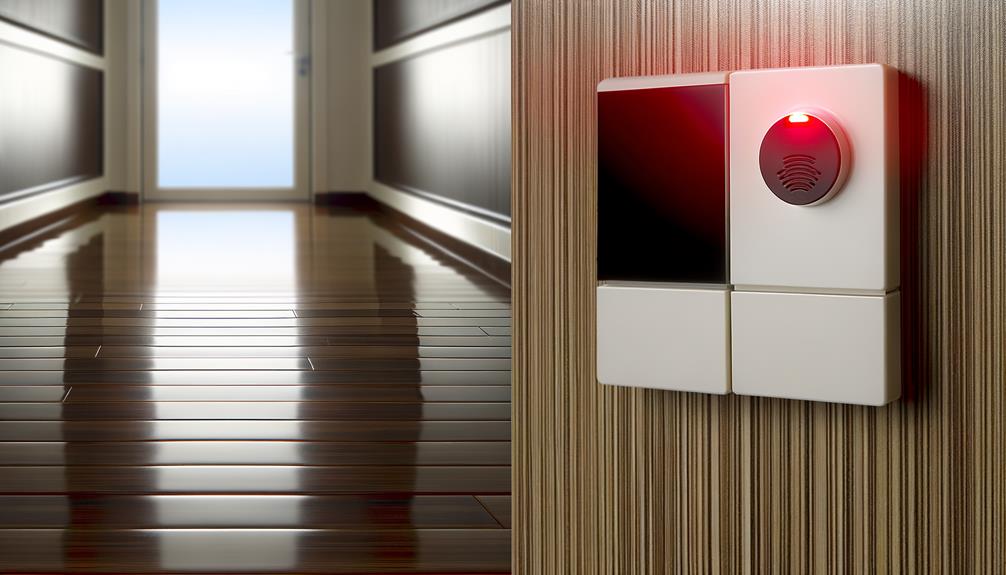
Brainstorm Security Shop

For Orders Over $199

On Any Of Our Products

Details On Refund Page
The implementation of an hotel door alarm has become a critical component in the evolving landscape of hospitality security. These device not only serve as a deterrent against unauthorized access but also reflect a growing commitment to safeguarding guest experiences. As hotels explore various models and technologies, the effectiveness of these systems raises important questions about their integration with broader security protocols. What factors should be prioritized when selecting the right type of door alarm, and how can they adapt to meet the diverse needs of modern establishments?
A hotel door alarm is a security device designed to enhance guest safety by alerting occupants and staff if unauthorized access occurs. These alarms serve a crucial role in hotel security, providing an additional layer of protection for guests and their belongings. Typically installed near guest room doors, these devices activate when someone attempts to open the door without proper authorization, emitting a loud sound to deter potential intruders and draw attention to the situation.
The implementation of hotel door alarms reflects a growing emphasis on guest safety in the hospitality industry. By integrating this technology, hotels can reassure guests that their security is a top priority, fostering a sense of safety and comfort during their stay.
In an environment where many individuals may be traveling alone or at odd hours, the presence of such alarms can significantly enhance their overall experience.
Moreover, hotel door alarms can be connected to the establishment’s security system, allowing staff to respond promptly to any alerts. This integration ensures that immediate action can be taken, further solidifying the hotel’s commitment to maintaining a secure environment for all guests.
Ultimately, hotel door alarms play a vital role in modern hospitality security measures.
Hotel door alarms operate through a combination of sensors and alert mechanisms designed to detect unauthorized access attempts. Typically, these systems utilize magnetic contact sensors, which are installed on the door and frame. When the door is opened, the magnetic circuit is broken, triggering the alarm. This immediate response enhances guest privacy by ensuring that any unauthorized entry is promptly identified.
In addition to magnetic sensors, many hotel door alarm systems incorporate advanced security technology, such as motion detectors and vibration sensors. Motion detectors can sense movement within a specified range, while vibration sensors detect tampering or forced entry. These features work in tandem to provide a comprehensive security solution.
Alarm systems are usually integrated with visual and auditory alerts, such as flashing lights or loud sirens, to deter intruders and notify hotel staff. Furthermore, modern systems may connect to centralized security monitoring stations, allowing for real-time responses to potential threats.
This integration bolsters overall guest safety, reaffirming the commitment of hotels to protect their patrons and ensure peace of mind during their stay. By leveraging these sophisticated systems, hotels significantly enhance their security protocols while prioritizing guest privacy.

When selecting a hotel door alarm, it is essential to evaluate key features such as alarm sensitivity settings, which can be customized to reduce false alarms.
Additionally, understanding the installation and maintenance requirements will ensure that the system operates effectively over time.
These considerations are crucial for enhancing security while maintaining guest comfort.
Effective alarm sensitivity settings are crucial for ensuring the optimal performance of hotel door alarms. Proper alarm calibration is essential to minimize false alarms while maintaining a secure environment.
When selecting door alarms, consider models that provide flexibility in sensitivity adjustments. This feature allows hotel management to tailor the alarm’s responsiveness based on specific operational needs and the environment in which the alarm is installed.
For instance, in areas with high foot traffic, a higher sensitivity setting may lead to frequent false alarms, potentially desensitizing staff to legitimate security threats. Conversely, in quieter locations, a lower sensitivity may be necessary to ensure the alarm activates appropriately without unnecessary triggers.
Additionally, advanced models may include programmable settings that enable staff to adjust sensitivity based on occupancy levels, events, or time of day. This level of customization enhances the effectiveness of the alarm system, ensuring that it meets the unique requirements of the hotel environment.
Ultimately, the right sensitivity settings contribute to a more secure atmosphere for guests and staff alike while reducing the risk of alarm fatigue.
Installing and maintaining hotel door alarms requires careful consideration of several key features to ensure optimal functionality and longevity. First and foremost, adherence to regulatory compliance is crucial. This ensures that the alarm systems not only meet industry standards but also protect guests and property effectively. Hotels should review local regulations regarding alarm systems to avoid potential legal issues.
Another critical aspect is the integration of robust installation processes. Proper placement of sensors and alarms is essential to maximize their effectiveness. Hotels should consider utilizing professional installation services to ensure that all components function as intended.
Maintenance is equally important; regular inspections and updates to the alarm systems help prevent malfunctions. Establishing a routine maintenance schedule can prolong the life of the equipment and enhance its reliability.
Additionally, staff training plays a vital role in the successful implementation of door alarm systems. Employees should be well-versed in the operation of alarms, troubleshooting common issues, and responding to alerts promptly.
The implementation of door alarms offers a significant enhancement to security measures in various settings, including hotels, residences, and commercial establishments. These systems serve as a deterrent against unauthorized access, effectively contributing to crime prevention efforts. By alerting personnel or occupants when a door is opened unexpectedly, door alarms play a crucial role in safeguarding both property and individuals.
In hotels, where guest safety is paramount, door alarms provide an added layer of protection for both guests and their belongings. The mere presence of an alarm can deter potential intruders, as the risk of detection increases significantly. Furthermore, in the event of an unauthorized entry, immediate notifications can prompt swift responses from security staff, minimizing the potential for harm.
In residential and commercial environments, the same principles apply. Door alarms foster a sense of security, encouraging occupants to feel safe in their surroundings. By investing in these systems, establishments demonstrate a commitment to protecting their guests and assets, thus enhancing their overall reputation.
Ultimately, the benefits of using door alarms extend beyond mere notifications; they contribute to a comprehensive security framework that prioritizes safety and peace of mind.

When considering hotel door alarms, it is essential to understand the various types available.
Wireless alarm systems offer flexibility and ease of installation, while hardwired options provide a reliable and permanent solution.
Additionally, portable alarm devices cater to guests seeking enhanced security during their travels.
As hotels continue to prioritize guest safety and security, various wireless alarm systems have emerged as effective solutions for monitoring door access. These systems leverage advanced wireless technology to ensure seamless integration with existing security measures, providing a comprehensive approach to hotel safety.
The integration of these wireless alarm systems not only enhances the overall security framework of hotels but also ensures a more responsive and efficient approach to guest safety.
While wireless alarm systems offer flexibility and ease of installation, hardwired alarm options present a reliable alternative for hotel security. These systems are directly connected to the building’s electrical infrastructure, ensuring consistent power supply and minimizing the risk of battery failure.
One of the primary hardwired benefits is their enhanced reliability; they are less susceptible to interference from environmental factors, making them suitable for high-traffic hotel environments.
Hardwired installation typically requires a more significant upfront investment and professional setup, but the long-term advantages often outweigh these initial costs. Once installed, these systems require minimal maintenance, reducing the need for regular battery checks and replacements.
Additionally, hardwired alarms can be integrated with other security measures, such as surveillance cameras and access control systems, providing a comprehensive security solution.
Furthermore, hardwired options often offer advanced features, such as real-time monitoring and instant notifications, which can be vital in emergency situations.
Portable alarm devices are increasingly popular among hotels seeking to enhance guest security without the need for extensive installation.
These innovative tools provide an added layer of portable security, ensuring that guests feel safe and secure during their stay. The convenience of these devices aligns perfectly with the growing emphasis on travel safety for modern travelers.
Here are three common types of portable alarm devices used in hotels:
When installing a hotel door alarm, attention to detail is crucial to ensure optimal functionality and security. Begin by selecting a suitable location for the alarm, typically near the door frame, where it can effectively monitor access points.
Ensure that all components are compatible with the door type and that the installation process adheres to manufacturer guidelines. Proper wiring and secure mounting are essential to prevent malfunctions.
Regular maintenance is vital to uphold guest safety and the reliability of the security technology. Schedule routine inspections to verify that the alarm system operates correctly.
Check batteries, sensors, and connections for signs of wear or malfunction. Promptly replace any faulty components to avoid compromising security.
Training staff on the alarm system’s operation and emergency protocols enhances overall effectiveness. Encourage them to report any irregularities immediately.
Additionally, keeping a log of maintenance activities can help track performance and identify recurring issues.

As hotel door alarms represent a foundational element of security, the future of hotel security systems is poised for significant advancements. The integration of emerging technologies will not only enhance safety but also address concerns around guest privacy.
As the hospitality industry evolves, here are three key developments to watch for:
As hoteliers embrace these innovations, the focus will remain on balancing robust security measures with the essential need for guest privacy, ensuring a safe and welcoming environment for all patrons.
In most establishments, guests are unable to disable alarms due to strict alarm regulations designed to enhance guest safety. These measures ensure that security systems remain operational, deterring unauthorized access and protecting all residents.
The effectiveness of theft prevention measures significantly impacts hotel security. Implementing robust alarm systems serves as a deterrent, enhancing guest safety and reducing the likelihood of theft, thereby fostering a secure environment for all patrons.
Door alarms typically require a power source, which can include various battery types or direct electrical connections. The choice of power options depends on the specific alarm model, ensuring optimal functionality and reliability in security applications.
Installing a personal door alarm in a hotel room enhances travel safety and personal security. Ensure compatibility with the door structure and respect hotel policies to maintain a secure environment while safeguarding your belongings.
Triggered hotel door alarms are typically designed to be loud to ensure immediate attention, enhancing hotel security and guest safety. Their volume serves to deter unauthorized access and alert nearby personnel or guests effectively.
In conclusion, hotel door alarms represent a crucial component of modern hotel security systems, enhancing guest safety through timely alerts of unauthorized access attempts. With various types available and customizable features, these devices effectively deter potential intruders while integrating seamlessly with existing security measures. The importance of proper installation and maintenance ensures optimal functionality. As the hospitality industry prioritizes guest protection, the continued evolution of door alarm technology will play a significant role in safeguarding hotel environments.

Brainstorm Security Shop
1867 Caravan Trail
Ste 105
Jacksonville, FL 32216
Call us toll free: (800) 859-5566